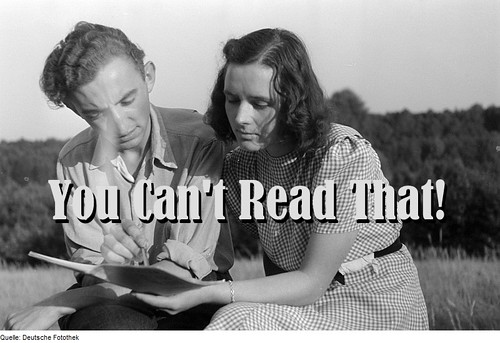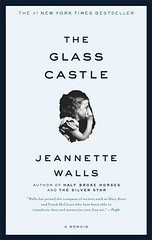You Can’t Read That! is a periodic post featuring banned book reviews and news roundups.

YCRT! Mini-Rant
In my previous YCRT! post I ranted about a dangerous idea gaining momentum in conservative and religious circles: requiring schools or publishers to put advisory ratings or content alerts on books that might be assigned to elementary and secondary school students.
As always, I find myself lagging the fight—they’re already doing it in a Waukesha, Wisconsin school district, where, just as I feared, administrators seeking to avoid confrontation with angry parents are taking the easy way out by automatically “red-flagging books that deal with sex, rape, extreme violence and brutality, and animal cruelty.”
Here’s another school district, this time in Texas, doing the same thing in a slightly different way, preemptively banning books that appear on the American Library Association’s “Most Frequently Challenged” list. Why, that’s even easier than scanning for content alerts or parental advisory labels, which do not yet appear on most books—just go to the ALA website and ban any book on the list, easy peasy!
I’ll say it again: preemptive book banning will be the result wherever this idea takes hold. Decision-makers will stop reviewing contested books for educational worth; they’ll rely instead on lists and alerts and before you know it anything even potentially controversial will be forbidden in classrooms and school libraries.

About the scale: it’s from Common Sense Media, one of the leading providers of parental advisory ratings.
The call for content alerts and advisory ratings plays out primarily at the elementary and secondary school level, but it’s spilling over into colleges and universities in the form of demands for “trigger warnings,” a particularly insidious foot in the door for preemptive censorship. The American Association of University Professors, for one, regards trigger warnings as a threat to academic freedom.
This tide is far from cresting, and I expect to be doing my best to help fight it for some time to come.
YCRT! News
In my state, Arizona, already infamous for banning books, a suburban Phoenix school board has voted to literally cut pages out of an honors biology textbook. The pages in question refer to abortion. A state statute requires sex ed or biology textbooks to “give preference, encouragement and support to childbirth and adoption as preferred options to elective abortion.” The textbook in question seems to do exactly that, but apparently mere mention of abortion as an elective option will not fly in sunny Arizona.
This may not be news to YCRT! readers, but a leading British paper, The Guardian, has picked up on what it calls “the recent rise in efforts to get books banned that cover poverty and social class.”
One thing guaranteed to get textbooks, novels, graphic novels, or memoirs banned from classroom use is homosexuality. In Maine, the barest hint of The Gay was enough to cause school administrators to cancel a high school production of the play Almost, Maine.
Lest you think book banning and censorship in America is confined to schools, grown-up adults in New York City are protesting and denouncing the Metropolitan Opera’s production of The Death of Klinghoffer, an opera about Palestinian terrorism. The Met has not canceled the actual performances, but has bowed to public pressure by canceling the planned international simulcast of the opera to movie theaters.
YCRT! Banned Book Review
 The Glass Castle
The Glass Castle
Jeannette Walls
Oh my gosh, I couldn’t put this book down! I read it straight through in two evenings; I’d have stayed up to dawn to finish it the first night if I were younger and didn’t need my sleep. That’s how readable this memoir is.
Walls’ memoir is divided into roughly three parts: the first covers her itinerant childhood in Arizona, California, and Nevada, from the time she is three until early elementary school age. The second deals with her family life in a poor coal mining town in West Virginia, lasting until she finishes the 11th grade, at which point she tears herself free of her family and strikes out for New York City to make her own life (the third part).
Reviewers always comment on what a rough life the Walls children had, living with a self-absorbed and mentally ill mother and an alcoholic father. If anyone in this vale of tears has whining rights, it is Jeannette Walls, yet she never does, not once. She describes the good and the bad of her life dispassionately and with clarity, and, especially in the first part of the book, conveys what it is to be a happy kid, oblivious to the hardships she has to endure, oblivious to her parents’ shortcomings (and rarely will you behold parents with so many of them).
I had a normal family life, but I knew kids with lives like hers when I was growing up, so I believe everything she says. I don’t think she embellishes the hardships one bit.
I actually frightened the dog while I was reading this book, exclaiming out loud as horror after horror unfolded. In the second part of Walls’ memoir, she describes how she began to see the truth about her parents, and how, though she still loved them and felt loved in return, she realized what awful parents they really were, finally confronting their utter uselessness. I quit talking out loud during this part of the book, because that’s when things got serious.
Were this a novel, one might expect a more dramatic break from her family in the third part, accompanied by some sort of moving denouement or confrontation. But no, this is a memoir. Jeannette merely moves away and makes her own life, one that has turned out to be quite successful. She continued to see her parents off and on while her father was still alive, she still sees her mother, she remains close to her siblings. It’s life, and she resolves herself to it, as we all must.
What can I compare The Glass Castle to? A Tree Grows in Brooklyn is the obvious answer. I loved it, I was moved by it, I couldn’t put it down.
Since The Glass Castle’s publication in 2005, a number of high schools have assigned it in advanced placement English courses. Since the memoir is frank and graphic in places, describing alcoholism, prostitution, and sexual and physical abuse, schools generally offer alternate reading choices for students who aren’t ready for real life. Nevertheless, parents from one side of the country to the other have repeatedly challenged The Glass Castle, trying to have it banned for all students.
The complaints revolve around Walls’ use of profanity, alleged (I didn’t see any) criticisms of Christianity, and the aforementioned accounts of sexual abuse and prostitution. I’m happy to say that teachers and school administrators have, for the most part, defended keeping the book on AP English reading lists, but it keeps popping up in the news as different parents in different parts of the country continue to try to have it banned. One teacher responded to a parental complaint with these words:
“I chose the text because it is commonly taught in AP Language and Composition classes as part of a memoir unit. Teachers and critics have praised the memoir for Walls’ honest account of positive life experiences as well as difficult incidents, citing her resilience and success in spite of such challenges as inspirational.”
I am not the only reader to find the memoir inspirational: The Glass Castle spent 261 weeks on the New York Times Bestseller list. In its first two years, over 2.5 million copies were printed and sold. It’s been translated into 22 languages, and has received the Christopher Award, the American Library Association’s Alex Award, and the Books for Better Living Award.
My life is better for having read it, and I wish I’d been able to read something like it when I was surrounded by kids just like the Wall children when I lived in Laramie, Wyoming as a junior high school student.